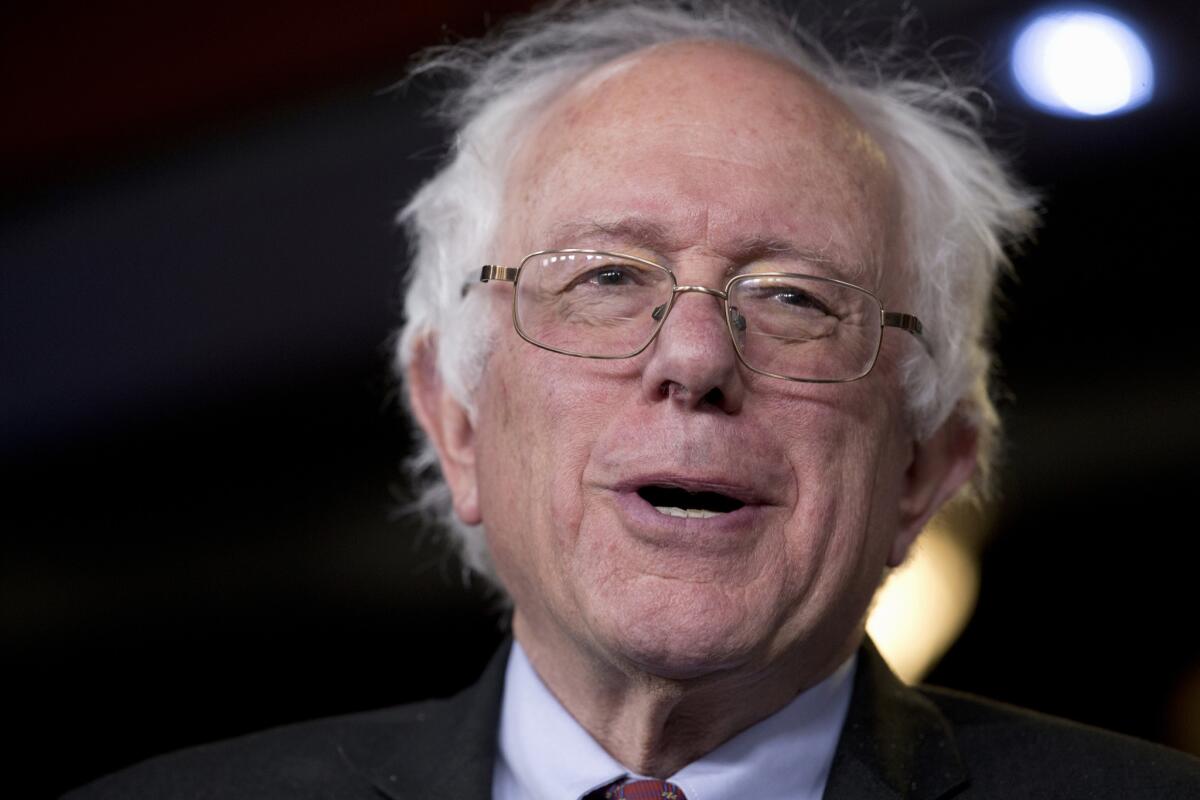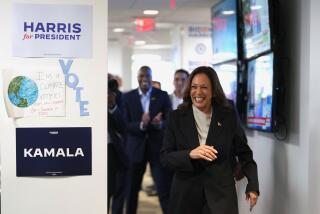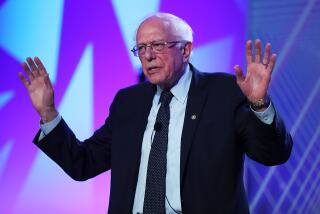Sen. Bernie Sanders launches presidential campaign focusing on inequality

Sen. Bernie Sanders of Vermont, speaking here Wednesday, announced Thursday that he’ll run for the Democratic nomination for president.
Reporting from Washington — Vermont Sen. Bernie Sanders, an independent and avowed socialist, formally launched his campaign for the presidency Thursday, promising to make the economic unease of America’s middle class the driving force of his long-shot bid.
In an era in which running for the nation’s highest office has become a vehicle for self-promotion for some, Sanders’ kickoff was a classic underdog pitch to draw greater attention to his chief issues, economic inequality and a political system increasingly tilted to the well-off.
“This campaign is not about Bernie Sanders,” the rumpled 73-year-old said at a news conference outside the Capitol. “It is about a grass-roots movement of Americans standing up and saying: ‘Enough is enough. This country and our government belong to all of us, not just a handful of billionaires.’”
“The major issue is, how do we create an economy that works for all of our people rather than a small number of billionaires?” he added.
Sanders, the longest-serving independent in the history of Congress, will campaign for the Democratic Party’s nomination, which he said gives him a better platform to engage in debates and mobilize support.
“The reality is that if you want to engage in debates, if you want to mobilize people, it is hard to do it outside the two-party system,” he told CBS News.
His entry makes him a leading potential challenger to former secretary of State and party heavyweight Hillary Rodham Clinton, if not for votes and campaign donations then for pressing her to maintain fidelity to progressive causes.
Already, the influence of Sanders and other prominent liberals like Sen. Elizabeth Warren (D-Mass.) has appeared to influence the early days of Clinton’s campaign. She has vowed to be a champion for the working class, and her kickoff video noted that while Americans “have fought their way back” from the Great Recession, “the deck is still stacked in favor of those at the top.”
“I agree with Bernie,” Clinton said in a tweet welcoming him to the race. “Focus must be on helping America’s middle class. GOP would hold them back.”
Sanders was elected as Vermont’s lone House representative in 1990. During his eight terms, he was embraced by his state’s Democratic Party, which didn’t field a candidate in either his 2006 or 2012 campaigns for Senate.
In Congress, Sanders has advocated for higher taxes on the wealthy and increasing the minimum wage, and is a lead opponent of President Obama’s proposed major trade deal among Pacific nations. In 2010, Sanders controlled the Senate floor for more than eight hours in opposition to an extension of lower tax rates.
Sanders also voted against the 2002 authorization that paved the way for the Iraq war. Clinton’s vote for that resolution figured prominently in her 2008 presidential run against Obama.
A national Quinnipiac University poll conducted in mid-April showed Clinton leading the race for the Democratic nomination with 60% support from primary voters. Sanders polled at 8%, just behind Vice President Joe Biden, but ahead of such potential Democratic hopefuls as former Maryland Gov. Martin O’Malley, former Virginia Sen. Jim Webb and former Rhode Island Sen. Lincoln Chafee.
But recent surveys from Public Policy Polling, a Democratic-leaning firm, showed Sanders cracking double-digit support in the early nominating states of Iowa and New Hampshire.
Still, the polling firm’s director, Tom Jensen, said Clinton’s front-runner status appears secure.
“He does have a chance to pick up enough support to bring attention to his issues and be part of the conversation,” Jensen said of Clinton’s first announced opponent for the nomination. “Certainly Sanders is more serious than O’Malley, Webb and Chafee because he has a real message and the credibility of being a big voice on the left for decades now.”
Candidates who occupy the role of forcing others to speak to issues that may be uncomfortable for them, a position Sanders is likely to ultimately end up in, are a time-honored tradition in politics. Among Republicans, Sen. Lindsey Graham of South Carolina has suggested that he might run a campaign focused on national security issues, an effort perhaps to counter Kentucky Sen. Rand Paul’s less hawkish views. Former Pennsylvania Sen. Rick Santorum has also held firm to strong socially conservative views on issues like abortion and gay marriage as others have flirted with softer views.
Rep. Debbie Wasserman Schultz (D-Fla.), the Democratic Party chair, welcomed Sanders to the contest, saying the senator was “well-recognized for his principled leadership and has consistently stood up for middle-class families.”
Sanders made no mention of Clinton in his remarks to reporters or in an email announcement to supporters. “This is not the Red Sox versus the Yankees,” the New England lawmaker vying against the New York-based Clinton campaign told reporters.
“In a democracy, what elections are about are serious debates over serious issues, not political gossip, not making campaigns into soap operas,” he said.
In response to reporters’ inquiries, though, Sanders said questions swirling about donations to the Clinton Foundation were a “fair issue,” but not one that he was most concerned with.
“What is more fair game to my campaign is the role of money in politics,” he said, specifically attacking the billionaire Koch brothers’ influence in Republican politics. “I wonder now in this day and age whether it is possible for any candidate who is not a billionaire or who is not beholden to the billionaire class to be able to run successful campaigns. If that is the case, I want you all to recognize what a sad state of affairs that is for American democracy.”
Sanders said he would run a “vigorous” campaign that would rely on small donors to sustain it.
“We’re in this race to win,” he said. “If you raise the issues that are on the hearts and minds of the American people, if you try to put together a movement … that’s not raising an issue, that’s winning elections.”
After his news conference, Sanders returned to the Capitol for Senate business. He will travel to the early primary state of New Hampshire this weekend for his first events as a candidate. He also plans a larger kickoff event in his home state in May.
For more Washington coverage, follow @mikememoli
More to Read
Get the L.A. Times Politics newsletter
Deeply reported insights into legislation, politics and policy from Sacramento, Washington and beyond. In your inbox three times per week.
You may occasionally receive promotional content from the Los Angeles Times.











